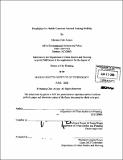Possibilities for health-conscious assisted housing mobility
Author(s)
Arcaya, Mariana Clair
DownloadFull printable version (15.06Mb)
Other Contributors
Massachusetts Institute of Technology. Dept. of Urban Studies and Planning.
Advisor
Xavier de Souza Briggs.
Terms of use
Metadata
Show full item recordAbstract
Many poor, segregated, urban neighborhoods are rife with risks to health, which contributes to stark racial and geographic disparities in health. Fighting health disparities requires buy-in from non-health professionals whose work directly impacts the way cities are designed and governed. This thesis provides a case study of one non-health initiative, assisted housing mobility, with clear relevance to health disparities. Research suggests that moving from high- to lower-poverty neighborhoods may confer a range of health benefits on individuals; however, assisted housing mobility programs are, to date, relocation-only interventions. Could these programs more deliberately promote health, and should they do so? Through interviews and a review of counseling materials, I examine. how nine assisted housing mobility programs are linked to health, how health is understood by program staff, and how managers might offer more health-conscious programming. Based on a review of pathways between health and housing and neighborhoods, I identified five areas of intervention around which managers could build healthful programs: housing units, neighborhoods, health behavior and awareness, social connectedness, and access to health services. For each area of intervention, I detail possibilities for active versus passive approaches, and document relevant practices from the profiled programs. I then explore practitioner attitudes towards integrating health into mobility programs. Although most practitioners see their work as disconnected from health, their programs actually play a promising mediating role. Concerns about mandate, privacy, legality, liability, and capacity hinder programs from exploring health. So does limited understanding of how to incorporate health appropriately. (cont.) Yet, most staff members are encouraged that their work may improve client health, and many want to do more. I recommend steps programs could take to provide better health-related information and discuss health more openly throughout housing counseling so families can make deliberate choices. I provide a preliminary assessment of relative costs and benefits of each step. I note that program managers will require technical and collegial support in order to implement the suggested changes well. The Poverty & Race Research Action Council, which helped guide my research, could provide needed support.
Description
Thesis (M.C.P.)--Massachusetts Institute of Technology, Dept. of Urban Studies and Planning, 2008. "June 2008." Includes bibliographical references.
Date issued
2008Department
Massachusetts Institute of Technology. Department of Urban Studies and PlanningPublisher
Massachusetts Institute of Technology
Keywords
Urban Studies and Planning.